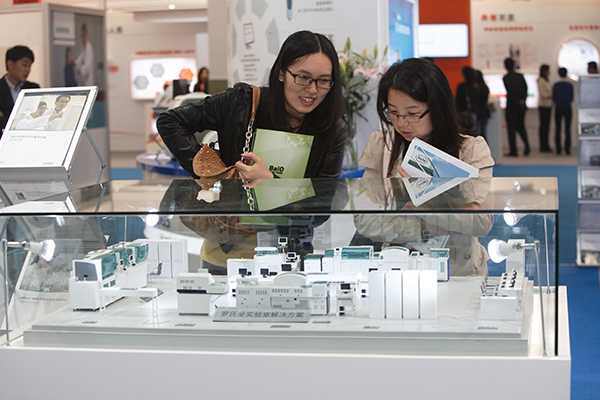FDI from the US rises 55.4 percent
 |
|
Visitors look at 3D-printed products at the Roche Group booth at a technology fair in Shanghai. [Photo/China Daily] |
Foreign investment mainly flows to services, and pharmaceutical and high-tech sectors
Foreign direct investment from the United States and the European Union surged by 55.4 percent and 43.9 percent, respectively, between January and November, the Ministry of Commerce said on Thursday.
The investment mainly flowed into service businesses including information, consulting and computing science, and the pharmaceutical and high-tech equipment manufacturing sectors, during this period.
Ministry spokesman Sun Jiwen said because of China's comparatively high productivity and market size, companies from developed markets enjoy a stable revenue growth and brand recognition, which enable them to invest more in the country.
Foreign investment gained by high-tech services business jumped 97.7 percent to 88.14 billion yuan ($12.71 billion) on a year-on-year basis in the first 11 months.
Foreign investment in the high-tech manufacturing sector amounted to 54.73 billion yuan, increasing 3.6 percent year-on-year.
"China has mature clusters of efficient suppliers for a large number of manufacturing businesses inside the country and across many neighboring markets, especially in Southeast Asia and Central Asia," said Sun.
Foreign direct investment in China rose 3.9 percent year-on-year to 731.8 billion yuan in the first 11 months of this year.
Within the EU, investment from the United Kingdom, Germany, Luxembourg and Sweden rose 120 percent, 87 percent, 129 percent and 48 percent, respectively, during the 11-month period.
Switzerland-based Roche Group invested $126.7 million in November to build an innovation center in Shanghai. The new facility will be operational in 2018.
Johnson Controls Inc, the United States-based manufacturer of energy storage, building equipment and control systems, will also open its second global headquarters with a capacity for 1,200 employees in Shanghai in April.
"China has been keen to stimulate global trade through the Belt and Road Initiative and seal various free trade deals such as the Regional Comprehensive Economic Partnership or Free Trade Area of the Asia-Pacific," said Mei Xinyu, a research fellow with the Research Academy at the Ministry of Commerce.
"Under such circumstances, foreign companies certainly don't want to miss such opportunities to ship more products to other markets from their plants in China," he said.
Alexandra Voss, executive director of the German Chamber of Commerce-North China, said the Yangtze River Delta region, Shanghai, Chongqing and Chengdu with strong consumption power, demand for industrial upgrading and infrastructure, will continue to remain attractive to German companies in the long run.
Gao Songya contributed to this story.

















